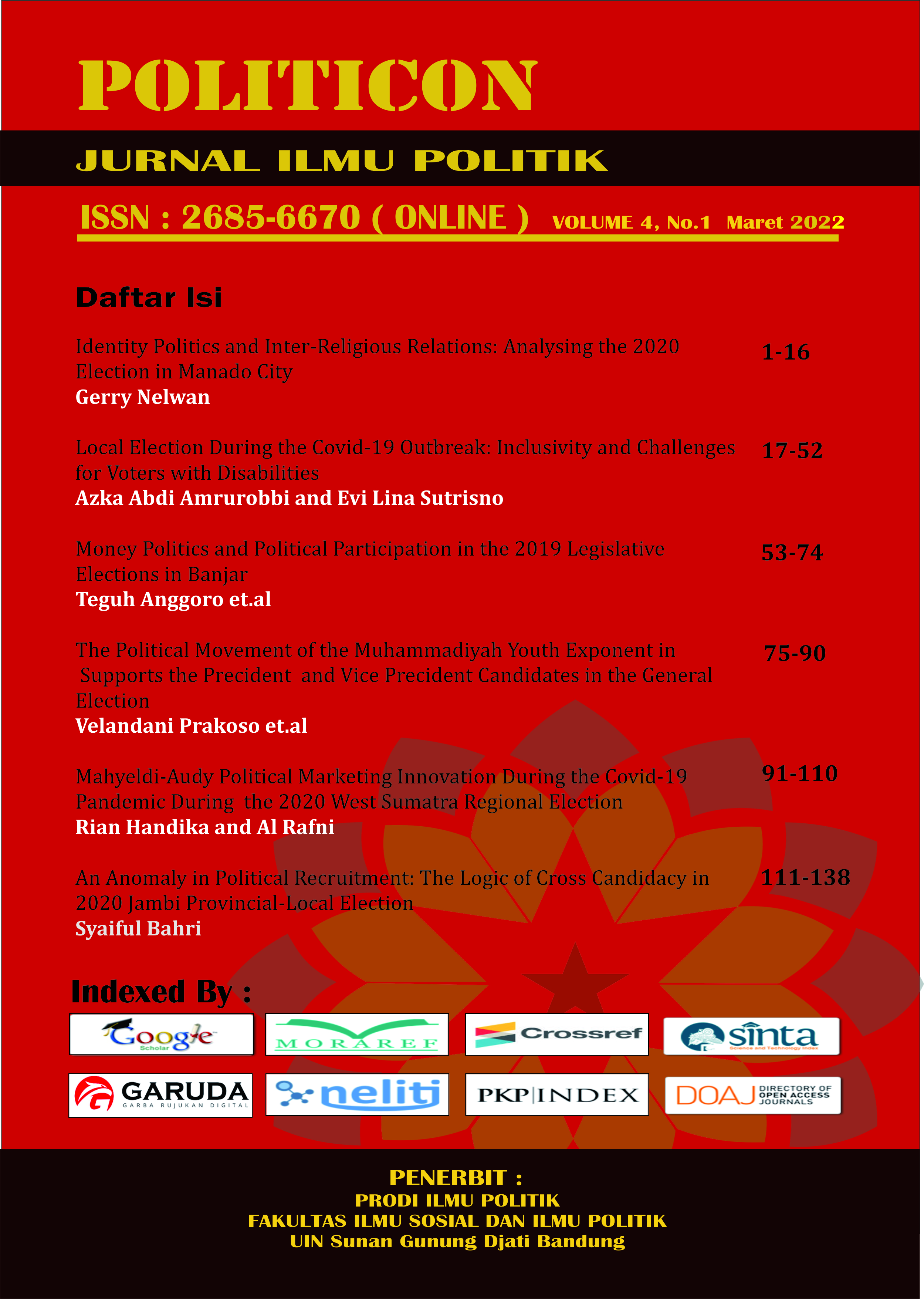The Political Movement of the Muhammadiyah Youth Exponent in Supports the Precident and Vice Precident Candidates in the General Election
DOI:
https://doi.org/10.15575/politicon.v4i1.16677Keywords:
Political Strategy, Muhammadiyah Youth Exponent, Presidential ElectionAbstract
This research focuses on the political movement strategy carried out by young Muhammadiyah exponents who have gathered in the Progressing Indonesia House (RIB) and the Indonesian Pencerah Alliance (API). Young Muhammadiyah exponents in this case are young Muhammadiyah cadres who have attended the cadre process and structurally have served in Muhammadiyah autonomous organizations. Â In reading the strategies of the political movement, a theoritical framwork is used, namely the structure of political opportunities, mobilization of resources, and framing of collective action. This study uses a descriptive qualitative approach and the analysis uses the Nvivo 12 Plus software. The research data were obtained from the results of interviews, document studies, and previous research which were related to each other. The results of this study indicate that young Muhammadiyah cadres realize that the Muhammadiyah Association is currently increasingly occupying a strategic position, both in its existence and as a strategic partner of the government. The growth and development of this awareness has spurred the construction of strategic, tactical, and futuristic thinking amidst many strategic choices and political articulations. The emergence of a political movement in the 2019 presidential election which was initiated by Muhammadiyah young exponential cadres is proof that there is a polarization that occurs in Muhammadiyah young cadres and indirectly becomes a fighting arena for cadres who are diaspora in the realm of national politics.
References
Al-hamdi, R. (2013). Islam and Politics: Political Attitudes of The Elites in Muhammadiyah 1998-2010. Indonesian Journal of Islam and Muslim Society.
Amalia, H. (2019). Muhammadiyah: Metode dan Praktik Berijtihad. Muaddib: Studi Kependidikan Dan Keislaman, 1(2), 119–130.
Anshari, Fajrin, & Nina, N. L. (2019). Sosialisasi Peran dan Posisi Angkatan Muda Muhammadiyah (AMM) pada Pemilu 2019 di Kalimantan Barat. Jurnal Buletin Al-Ribaath, 16(1), 21–25.
Argenti, G. (2017). Civil Society dan Politik Moral Muhammadiyah. Jurnal Politikom Indonesiana, 2(2).
Arifin, S. (2018). Sosialisasi Pemilu Kepada Pemuda guna Menciptaka Pemuda yang Sadar Pemilu di Kota Banjarmasin. Arsip Publikasi Ilmiah Biro Administrasi Akademik.
Budiman, S. A., & Mulyer, M. S. (2019). Peran Ormas Islam dalam Menjaga Stabilitas Politik Sosial Budaya Indonesia Pasca Pemilu 2019 (Kajian Pustaka pada Organisasi Islam Terbesar NU dan Muhammadiyah. Jurnal Renaissance, 4(2), 560–563.
Creswell, J. W. (2019). Research Design. Pustaka Pelajar.
Jurdi, S. (2010). Muhammadiyah dalam Dinamika Politik Indonesia 1966-2006. Pustaka Pelajar.
McAdam, D., Sidney, T., & Tilly, C. (2001). Dynamics of Cotention. Cambridge University Press.
Miles, M., & Huberman, M. (1992). Qualitative Data Analysis: A Sourcebook of New Method. Terjemahan Tjetjep Rohendi Rohidi. Analisis Data Kualitatif: Buku Sumber tentang Metode-metode Baru. Penerbit Universitas Indonesia (UI-PRESS).
Nashir, H., Nurmandi, A., & Effendi, D. (2017). Is Electoneering a Religious Practice? Electoral Politics of Muhammadiyah Cadres at The Regent Elections in Yogyakarta Province.
Nashir, H., Qodir, Z., Nurmandi, A., Jubba, H., & Hidayati, M. (2019). Muhammadiyah’s Moderation Stance in The 2019 General Election. Journal of Islamic Studies.
Noor, M. (2018). Tahun Politik: Antara Demokrasi Prosedural-Subtansial. Mimbar Administrasi, 2(1), 1–7.
Nubowo, & Jefferson. (2019). The Three Streams Facing Indonesian Muslims. Nanyang Technological University.
Nurmandi, A., Qodir, Z., & Yamin. (2015). Ijtihad Politik Muhammadiyah: Politik Sebagai Amal Usaha. Pustaka Pelajar.
Redhani, M. E. (2020). Sosialisasi Pemilu Kepada Pe. Jurnal Pengabdian Al-Ikhlas Universitas Islam Kalimantan Muhammad Arsyad Al Banjary, 6(1).
Saepulah, S., Herlina, L., & Fauzi, U. (2020). The Dynamics of the Role of the Nahdlatul Ulama Social Movement in Responding to Social Change. International Journal of Islamic Khazanah, 10(1), 27-33.
Sholikhin, A. (2018). Perbedaan Sikap Politik Elektoral
Muhammadiyah antara Pusat dan Daerah. Jurnal Polinter: Kajian
Politik Dan Hubungan Internasional, 3(2).
Solokhin, A. (2018). Perbedaan Sikap Politik Elektoral Muhammadiyah Antara Pusat dan Daerah. Jurnal Polinter Prodi Ilmu Poltik FISIP UTA’45.
Suharto, A., Cahyono, H., & Prihma, S. (2021). Gerakan Pemuda Muhammadiyah dalam Memperkokoh Identitas Nasional. Civic-Culuture: Jurnal Ilmu Pendidikan PKN Dan Sosioal Budaya, 5(2), 494–508.
Sukmawati, A., & Rafni, A. (2020). Peran Organisasi Kepemudaan Ikatan Mahasiswa Muhammadiyah dalam Melaksanakan Pendidikan Politik bagi Pemuda di Kota Padang. Journal of Civic Education, 3(2), 191–199.
Syahputra, H. (2014). Peran Politik Muhammadiyah Tahun 2010-2014. Journal of Governance and Policy, 1(1).
Downloads
Published
How to Cite
Issue
Section
License
Authors who publish with this journal agree to the following terms:
- Authors retain copyright and grant the journal right of first publication with the work simultaneously licensed under a Creative Commons Attribution-ShareAlike 4.0 International License that allows others to share the work with an acknowledgment of the work's authorship and initial publication in this journal.
- Authors are able to enter into separate, additional contractual arrangements for the non-exclusive distribution of the journal's published version of the work (e.g., post it to an institutional repository or publish it in a book), with an acknowledgment of its initial publication in this journal.
- Authors are permitted and encouraged to post their work online (e.g., in institutional repositories or on their website) prior to and during the submission process, as it can lead to productive exchanges, as well as earlier and greater citation of published work (See The Effect of Open Access).





.jpg)



